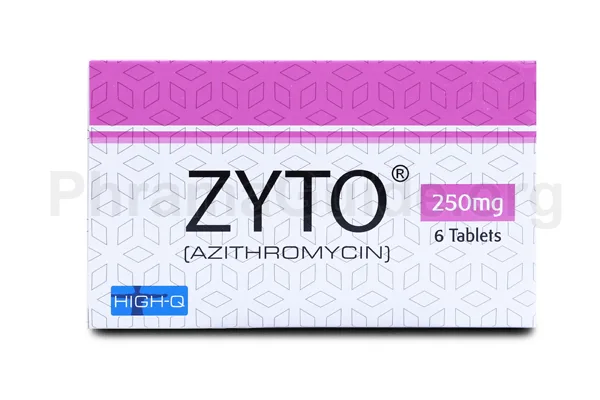Zyto is an antibiotic used to treat a variety of bacterial infections. While it’s generally well-tolerated, it can still cause side effects in some individuals. Here are some common and less common side effects of Zyto.
Common Side Effects
- Gastrointestinal Issues: These are the most frequently reported side effects of Zyto, which may include nausea, vomiting, diarrhea, abdominal pain, and occasionally, indigestion.
- Headache and Dizziness: Some individuals may experience headaches or dizziness while taking Zyto.
- Skin Reactions: Rash or itching can occur as a reaction to Zyto. In some cases, this might indicate an allergic response, so it’s essential to monitor any skin changes and seek medical advice if they worsen or are accompanied by other symptoms.
- Changes in Taste or Smell: Zyto can sometimes cause alterations in taste or smell perception.
- Vaginal Yeast Infection: In women, Zyto might disturb the normal balance of bacteria in the vagina, leading to a yeast infection.
- Liver Function Changes: In rare cases, Zyto can cause temporary changes in liver function tests, although severe liver damage is very uncommon.
- Heart Rhythm Changes: There have been reports of Zyto affecting the heart’s electrical activity, particularly in individuals with pre-existing heart conditions or those taking medications that affect heart rhythm.
- Allergic Reactions: While uncommon, some individuals might experience severe allergic reactions to Zyto, leading to symptoms like hives, swelling of the face or throat, and difficulty breathing. Anaphylaxis is a rare but serious allergic reaction that requires immediate medical attention.
Less Common Side Effects
- Digestive Disturbances: Zyto can rarely cause more severe gastrointestinal issues such as pancreatitis or inflammation of the pancreas. This may present as severe abdominal pain that requires immediate medical attention.
- Nervous System Effects: Some individuals may experience nervous system-related side effects such as drowsiness, vertigo (a sensation of spinning), or even rare cases of convulsions or seizures.
- Skin and Sensitivity Reactions: Less commonly, Zyto might lead to severe skin reactions, including Stevens-Johnson syndrome or toxic epidermal necrolysis, which are serious skin conditions requiring urgent medical attention. Photosensitivity (increased sensitivity to sunlight) leading to skin reactions after sun exposure can also occur.
- Blood Disorders: Rarely, Zyto can affect blood cells, causing changes in white blood cell count, potentially leading to leukopenia (low white blood cell count), thrombocytopenia (low platelet count), or other blood disorders.
- Hearing Loss: In very rare instances, Zyto has been associated with reversible hearing loss or tinnitus (ringing in the ears), especially when taken in high doses.
- Cardiac Effects: Though rare, Zyto has been associated with an increased risk of QT prolongation (a heart rhythm disorder) in susceptible individuals, particularly those with pre-existing heart conditions or those taking medications that affect heart rhythm.
- Liver and Kidney Function: In some cases, Zyto may cause abnormalities in liver enzymes or kidney function tests. Severe complications in these organs due to Zyto are extremely uncommon.
- Antibiotic Resistance: Prolonged or unnecessary use of Zyto can contribute to antibiotic resistance, making future infections more challenging to treat.

What is Zyto?
Zyto is one of the leading brands of Azithromycin, manufactured and marketed by High-Q Pharmaceuticals (Pvt) Ltd, Pakistan.
Zyto : Available Formulations and Strengths
Presently, Zyto is available in Tablets and Suspension Forms with the following strengths.
Zyto Tablets : 250mg and 500mg strengths.
Zyto Suspension : 200mg/5ml strength.
What Are The Possible Drug Interactions of Zyto?
- Antacids and Acid Blockers: Antacids containing aluminum or magnesium and acid-blocking medications like proton pump inhibitors can reduce the absorption of Zyto if taken simultaneously. It’s advisable to take these medications a few hours apart from Zyto.
- Blood Thinners: Zyto might increase the effects of blood thinners like warfarin, leading to an increased risk of bleeding. Close monitoring of blood clotting parameters is advisable if these medications are taken together.
- Ergotamine and Dihydroergotamine: Zyto can potentially increase the concentration of these medications in the blood, raising the risk of ergot toxicity, which can lead to serious side effects.
- Digoxin: Zyto might increase the levels of digoxin in the blood, leading to a risk of digoxin toxicity. Monitoring digoxin levels and adjusting the dosage as needed is essential if these medications are used together.
- Statins: There’s a potential interaction between Zyto and certain statin medications used to lower cholesterol levels, which can increase the risk of muscle-related side effects, such as muscle pain or weakness.
- Cyclosporine: Zyto might increase the blood levels of cyclosporine, a medication used in transplant patients to prevent organ rejection. Close monitoring of cyclosporine levels and potential dosage adjustments may be necessary when taking these medications together.
- Antibiotics and Antifungals: Zyto can interact with other antibiotics or antifungal medications, leading to potential interactions that might affect their efficacy or increase the risk of side effects.
- Medications Affecting Heart Rhythm: Zyto can prolong the QT interval, and when taken with other medications that also affect heart rhythm (e.g., certain antiarrhythmic drugs), it can increase the risk of serious cardiac arrhythmias.

Leave A Comment